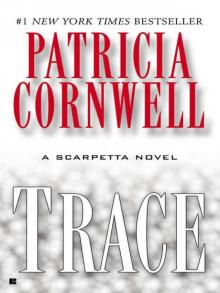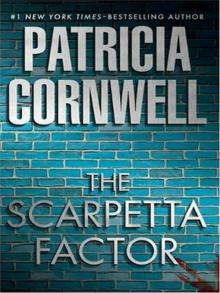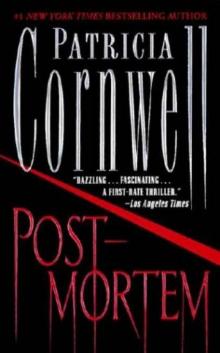- Home
- Patricia Cornwell
Predator Page 11
Predator Read online
Page 11
In the MRI lab, the structure of another so-called normal’s brain is being scanned.
“Just how bad is the weather up there?” Scarpetta is saying over the phone.
Dr. Lane pushes the intercom button. “Are you all right?” she asks their latest research study subject for PREDATOR.
He claims to be normal. He probably isn’t. He has no idea the point is to compare his brain to a killer’s.
“I don’t know,” the normal’s unnerved voice answers.
“It’s okay,” Benton is saying to Scarpetta over the phone. “If you don’t get delayed again. But tomorrow night it’s supposed to get bad….”
BWAWWH…BWAWWH…BWAWH…BWAWH…
“I can’t hear a damn thing,” he says in exasperation.
The reception is bad. Sometimes his cell phone doesn’t even ring in here, and he is distracted, frustrated, tired. The scan isn’t going well. Nothing has gone well today. Dr. Lane is dejected. Josh sits in front of his screen, bored.
“I don’t feel hopeful,” Dr. Lane says to Benton, a resigned look on her face. “Even with earplugs.”
Twice today, normal control subjects have refused to be scanned because they’re claustrophobic, a detail they failed to mention when they were accepted into the study. Now this control subject is complaining about the noise, says it sounds like electric bass guitars being played in hell. At least he’s creative.
“I’ll call before I take off,” Scarpetta is saying over the phone. “The ad looks fine, as fine as any of them look.”
“Thanks for the enthusiasm. We’re going to need a big response. The casualties are mounting. Must be something phobic in the air. Add to that, about one out of three normal subjects isn’t.”
“I’m not sure what’s normal anymore.”
Benton covers his other ear, walks around, trying to hear, trying to get a better signal. “I’m afraid a big case has come in, Kay. It’s going to be a lot of work.”
“How are we doing in there?” Dr. Lane asks over the intercom.
“Not good,” the subject’s voice comes back.
“They always do when we’re about to get together,” Scarpetta is saying above what now sounds like a hammer rapidly striking wood. “I’ll help in any way I can.”
“I’m really starting to freak out,” the normal subject’s voice says.
“This isn’t going to work.” Benton looks through the Plexiglas at the normal control subject on the far side of the magnet.
He is moving his taped-down head.
“Susan?” Benton looks at her.
“I know,” Dr. Lane says. “I’m going to need to reposition him.”
“Good luck. I think he’s done,” Benton says.
“He’s destroyed the landmark,” Josh looks up and says.
“Okay,” Dr. Lane tells the subject. “We’re going to stop. I’m coming in to get you out.”
“I’m sorry, man, I can’t take this,” his stressed voice sounds.
“Sorry. Another one bites the dust,” Benton says to Scarpetta over the phone as he watches Dr. Lane open the magnet room and head in to free their latest failure. “I just spent two hours evaluating this guy and bye-bye. He’s out. Josh?” Benton says. “Call someone to get him a taxi.”
Black leather creaks as Marino makes himself comfortable in his Harley gear. He goes out of his way to show how relaxed he is, slumped back in the chair, his legs spread.
“What ad?” he asks when Scarpetta hangs up.
“Just another research study he’s involved in up there.”
“Huh. What kind of study?” He says it as if he is suspicious of something.
“A neuropsychological study. How different types of people process different types of information, that sort of thing.”
“Huh. That’s a line all right. Probably the same line they use every time a reporter calls, a line that says nothing. What did you want to see me about?”
“Did you get my messages? Since Sunday night, I’ve left you four.”
“Yeah I got them.”
“It would have been nice if you’d returned them.”
“You didn’t say it was a nine-one-one.”
That has been their code over the years when they paged each other, back when cell phones weren’t so popular, then later because they were insecure. Now Lucy has scramblers and who-knows-what to protect privacy, and it’s fine to leave voicemail.
“I don’t leave a nine-one-one when it’s a phone message,” she says. “How does that work? After the beep I say ‘nine-one-one’?”
“My point being, you didn’t say it was an emergency. What did you want?”
“You stood me up. We were set to review the Swift case, remember?”
She fixed dinner for him, too, but she leaves out that part.
“I’ve been busy, on the road.”
“Would you like to tell me what you’ve been doing and where?”
“Riding my new bike.”
“For two solid days? You didn’t stop for gas, maybe go to the men’s room? Couldn’t find time for one phone call?”
She leans back in the big chair behind her big desk and feels small as she looks at him. “You’re being contraire. That’s what this is about.”
“Why should I tell you what I’m doing?”
“Because I’m the director of forensic science and medicine, if for no other reason.”
“And I’m the head of investigations, and that really falls under training and Special Ops. So Lucy’s really my supervisor, not really you.”
“Lucy isn’t your supervisor.”
“Guess you’d really better talk to her about that.”
“Investigations really falls under forensic science and medicine. You really aren’t a Special Ops agent, Marino. My department pays your salary. Really.” She is about to rip into him and knows she shouldn’t.
He looks at her with his big, tough face, his big, thick fingers drumming the armrest. He crosses his legs and starts jiggling a big Harley-booted foot.
“Your job is to assist me in casework,” she says. “You’re the person I depend on most.”
“Guess you better take that up with Lucy.”
He slowly drums the armrest and jiggles his foot, his flinty eyes looking past her.
“I’m supposed to tell you everything and you don’t tell me shit,” he says. “You do whatever the hell you want and don’t think you ever owe me an explanation. I’m sitting right here, listening to you lie like I’m so stupid I don’t see through it. You don’t ask or tell me nothing unless it suits you.”
“I don’t work for you, Marino.” She can’t stop herself from saying it. “I believe it’s the other way around.”
“Oh yeah?”
He leans closer to her big desk, his face turning crimson.
“Ask Lucy,” he says. “She owns this damn place. She pays everybody’s salary. Ask her.”
“Obviously, you weren’t present for most of our discussion about the Swift case,” she says, changing her tone, trying to abort what is about to turn into a battle.
“Why bother? I’m the one with the damn information.”
“We were hoping you might share it. We’re all in this together.”
“No kidding. Everybody’s into everything. Nothing of mine’s private anymore. It’s open season on my old cases, my hell scenes. You just give away whatever you want and don’t care how I feel.”
“That’s not true. I wish you’d calm down. I don’t want you having a stroke.”
“You hear about yesterday’s hell scene? Where do you think that came from? He’s getting into our files.”
“That’s not possible. The hard copies are locked up. Electronic copies are completely inaccessible. As for yesterday’s hell scene, I agree it’s very similar…”
“Similar my ass. It’s exactly the same.”
“Marino, it was also in the news. In fact, you can still pull it up on the Internet. I checked.”
His b
ig flushed face stares at her, a face so unfriendly she scarcely recognizes it anymore.
“Can we talk about Johnny Swift for a minute, please?” she says.
“Ask me anything you want,” he says glumly.
“I’m confused about the possibility of robbery as a motive. Was there a robbery or not?”
“Nothing of value missing from the house except we can’t figure out the credit-card shit.”
“What credit-card shit?”
“The week after his death, someone withdrew a total of twenty-five hundred dollars cash. Each withdrawal was five hundred bucks from five different ATMs in the Hollywood area.”
“Tracked?”
Marino shrugs and says, “Yeah. To machines in parking lots, different days, different times, everything different except the amount. Always the limit of five hundred bucks. By the time the credit-card company tried to notify Johnny Swift—who was dead by then—about an out-of-pattern behavior that might indicate someone was using his card, the withdrawals had stopped.”
“What about cameras? Any chance the person was caught on video?”
“Each ATM machine that was picked didn’t have one. Somebody knew what he was doing, has probably done it before.”
“Did Laurel have the PIN number?”
“Johnny wasn’t able to drive yet because of the surgery. So Laurel had to do everything, including cash withdrawals.”
“Anybody else have the PIN number?”
“Not as far as we know.”
“It certainly doesn’t look good for him,” Scarpetta says.
“Well, I don’t think he whacked his twin brother for his ATM card.”
“People have killed for a lot less.”
“I think we’re talking someone else, maybe someone Johnny Swift had some kind of encounter with. Maybe the person had just killed him and heard Laurel drive up. So he ducked, explaining why the shotgun was still on the floor. Then when Laurel ran from the house, the guy grabbed it and bolted.”
“Why was the shotgun on the floor to begin with?”
“Maybe he was staging the scene to look like a suicide and got interrupted.”
“You’re telling me you have no doubt it’s a homicide.”
“You telling me you don’t think it is?”
“I’m just asking questions.”
Marino’s eyes wander around the office, over the top of her piled desk, across stacks of paperwork and case files. He looks at her with hard eyes that she might find frightening had she not seen insecurity and pain in them so often in the past. Maybe he seems different and distant only because he shaves his balding head and has taken to wearing a diamond stud earring. He works out in the gym obsessively and is the biggest she’s ever seen him.
“I’d appreciate it if you’d review my hell scenes,” he says. “Every one I’ve ever come up with is on that disk. I’d like you to look at them carefully. Since you’ll be sitting on a plane with nothing better to do.”
“I might have something better to do.” She tries to tease him a little, get him to lighten up.
It doesn’t work.
“Rose put all of them on a disk going back to the first of last year, and it’s in the file there. In a sealed envelope”—he indicates files on her desk. “Maybe you can pop it in your laptop and take a look. The bullet with the mesh pattern from the screen door’s in there. That lying piece of shit. I swear I came up with it first.”
“You do a search on the Internet of intermediary targets in shootings and I guarantee you’ll find cases and firearms tests that include bullets fired through screen doors,” she says. “I’m afraid there really isn’t much that’s new or private anymore.”
“He’s nothing but a laboratory rat who lived inside a microscope until a year ago. He couldn’t know the stuff he’s writing about. It’s impossible. It’s because of what happened at the Body Farm. At least you could have been honest about it.”
“You’re right,” she says. “I should have told you I stopped reviewing your hell scenes after that. All of us did. I should have sat you down and explained, but you were so angry and combative, none of us wanted to deal with you.”
“Maybe if you got set up the way I did, you’d be angry and combative, too.”
“Joe wasn’t at the Body Farm or even in Knoxville when it happened,” she reminds him. “So please explain how he could have slipped a hypodermic needle into a dead man’s jacket pocket.”
“The field exercise was supposed to expose the students to a real dead body rotting away at the Body Farm and see if they could overcome the puke factor and recover several items of evidence. A dirty needle wasn’t one of them. He set that up to get me.”
“Not everybody is out to get you.”
“If he didn’t set me up, then why did the girl not follow through with the lawsuit? Because it’s bogus, that’s why. The damn needle didn’t have AIDS on it, now did it, had never been used. A little oversight on the asshole’s part.”
She gets up from her desk.
“What I’m going to do about you is the bigger issue,” she says, locking her briefcase.
“I’m not the one who has secrets,” he says, watching her.
“You have plenty of secrets. I never know where you are or what you’re doing half the time.”
She grabs her suit jacket off the back of the door. He looks steadily at her with his flinty eyes. His fingers stop drumming the armrest. Leather creaks as he gets up from his chair.
“Benton must feel like a real big shot working with all those Harvard people,” he says, and it’s not the first time he’s said it. “All those rocket scientists with all their secrets.”
She stares at him, her hand on the doorknob. Maybe she’s getting paranoid, too.
“Yup. Must be exciting, what he’s doing up there. But if you’d asked my opinion, I’d been happy to tell you not to waste your time.”
It can’t be possible he is alluding to PREDATOR.
“Not to mention a waste of money. Money that could sure as hell be better spent. Me? I just can’t stomach the thought of giving all that money and attention to scum-bags like that.”
No one is supposed to know about PREDATOR except the study team, the hospital’s president, the Internal Review Board and certain key prison officials. Even the normal subjects in the study don’t know the name of it or what it is about. Marino couldn’t know unless he has somehow broken into her e-mail or the hard copies she keeps locked up in file drawers. For the first time, it occurs to her that if anyone is breaching security, it might be him.
“What are you talking about?” she asks quietly.
“Maybe you should be more careful about forwarding files, make sure nothing is attached to them,” he replies.
“Forwarding what files?”
“The notes you typed up after your first meeting with Darling Dave about that shaken baby case he wants everyone to think is an accident.”
“I didn’t forward any notes to you.”
“Sure as hell did. Sent this past Friday, didn’t happen to open it until after I saw you on Sunday. Notes accidentally attached to an e-mail to you from Benton. An e-mail I sure as hell wasn’t supposed to see.”
“I didn’t,” she insists with growing alarm. “I didn’t send you anything.”
“Maybe not on purpose. Funny how lies catch up with people,” he says as a light knock sounds at the door.
“Is that why you didn’t show up at my house Sunday night? Why you didn’t show up for the meeting with Dave yesterday morning?”
“Excuse me,” Rose says as she lets herself in. “I think one of you should handle this.”
“You could have said something, given me a chance to defend myself,” Scarpetta says to him. “I may not always tell you everything, but I don’t lie.”
“Lying by omission is still lying.”
“Excuse me,” Rose tries again.
“PREDATOR,” Marino says to Scarpetta. “Try that lie on for size.”
> “Mrs. Simister,” Rose interrupts them loudly. “The lady from the church who called a little while ago. I’m sorry, but it seems rather urgent.”
Marino makes no move to go to the phone, as if to remind Scarpetta that he doesn’t work for her, that she can take the call herself.
“Oh for God’s sake,” she says, walking back to her desk. “Put her through.”
24
Marino digs his hands into the pockets of his jeans and leans against the doorway, watching her deal with whoever Mrs. Simister is.
In the old days, he used to enjoy sitting in Scarpetta’s office for hours, listening to her while he drank coffee and smoked. He didn’t mind asking her to explain what he didn’t understand, didn’t mind waiting when she was interrupted, which was often. He didn’t mind when she was late.
Things are different now, and it’s her damn fault. He doesn’t intend to wait for her. He doesn’t want her to explain anything and would rather remain ignorant than ask her a medical question, professional or personal, even if he was dying, and he used to ask her whatever he wanted. Then she betrayed him. She humiliated him and meant to, and is doing it again and means to, no matter what she says. She has always rationalized whatever suits her, done hurtful things in the name of logic and science, as if she thinks he is so stupid he’ll never see through it.
It’s no different than what happened to Doris. She came home one day crying, and he couldn’t tell if she was angry or sad but he knew she was upset, maybe as upset as he had ever seen her.
What’s the matter? He going to have to pull your tooth? Marino asked her as he drank beer in his favorite chair and watched the news.
Doris sat down on the sofa and sobbed.
Shit. What is it, baby?
She covered her face and cried as if someone were about to die, so Marino sat next to her and put his arm around her. He held her for a few minutes, and when no information was forthcoming, he demanded she tell him what the hell was wrong.
He touched me, she said, crying. I knew it wasn’t right and I kept asking him why, but he said to relax, that he’s a doctor, and a part of me knew what he was doing but I was scared. I should have known better, should have said no but I just didn’t know what to do, and she went on to explain that the dentist or root canal specialist or whatever the hell he called himself said Doris possibly had a systemic infection because of a root fracture and he needed to check her glands. That was the word he used, according to Doris.

 Blow Fly
Blow Fly Unnatural Exposure
Unnatural Exposure The Bone Bed
The Bone Bed Book of the Dead
Book of the Dead Flesh and Blood: A Scarpetta Novel (Scarpetta Novels Book 22)
Flesh and Blood: A Scarpetta Novel (Scarpetta Novels Book 22) Red Mist
Red Mist Cruel & Unusual
Cruel & Unusual Hornet's Nest
Hornet's Nest Four Scarpetta Novels
Four Scarpetta Novels Scarpetta's Winter Table
Scarpetta's Winter Table Isle of Dogs
Isle of Dogs Trace
Trace Postmortem
Postmortem Body of Evidence ks-2
Body of Evidence ks-2 Southern Cross
Southern Cross All That Remains
All That Remains Point of Origin
Point of Origin Depraved Heart
Depraved Heart Ruth, a Portrait: The Story of Ruth Bell Graham
Ruth, a Portrait: The Story of Ruth Bell Graham From Potter's Field
From Potter's Field Flesh and Blood
Flesh and Blood Dust
Dust The Body Farm
The Body Farm Port Mortuary
Port Mortuary Quantum
Quantum Portrait of a Killer: Jack the Ripper - Case Closed
Portrait of a Killer: Jack the Ripper - Case Closed Spin (Captain Chase)
Spin (Captain Chase) Cause of Death
Cause of Death The Scarpetta Factor
The Scarpetta Factor Predator
Predator Scarpetta 18 - Port Mortuary
Scarpetta 18 - Port Mortuary Trace ks-13
Trace ks-13 Portrait of a Killer
Portrait of a Killer Cruel and Unusual ks-4
Cruel and Unusual ks-4 Cause Of Death ks-7
Cause Of Death ks-7 Dust ks-21
Dust ks-21 At Risk wg-1
At Risk wg-1 The Last Precinct ks-11
The Last Precinct ks-11 Book of the Dead ks-15
Book of the Dead ks-15 All That Remains ks-3
All That Remains ks-3 Ruth, a Portrait
Ruth, a Portrait Scarpetta's Winter Table (kay scarpetta)
Scarpetta's Winter Table (kay scarpetta) From Potter's Field ks-6
From Potter's Field ks-6 Scarpetta
Scarpetta Isle of Dogs jhabavw-3
Isle of Dogs jhabavw-3 Hornet's Nest jhabavw-1
Hornet's Nest jhabavw-1 The Body Farm ks-5
The Body Farm ks-5 Blow Fly ks-12
Blow Fly ks-12 Post Mortem
Post Mortem Five Scarpetta Novels
Five Scarpetta Novels Chasing the Ripper (Kindle Single)
Chasing the Ripper (Kindle Single) Point of Origin ks-9
Point of Origin ks-9 Port Mortuary (2010)
Port Mortuary (2010) Unnatural Exposure ks-8
Unnatural Exposure ks-8 Southern Cross uhabavw-2
Southern Cross uhabavw-2 The Bone Bed ks-20
The Bone Bed ks-20 Red Mist ks-19
Red Mist ks-19 Port Mortuary (2010) ks-18
Port Mortuary (2010) ks-18 Predator ks-14
Predator ks-14